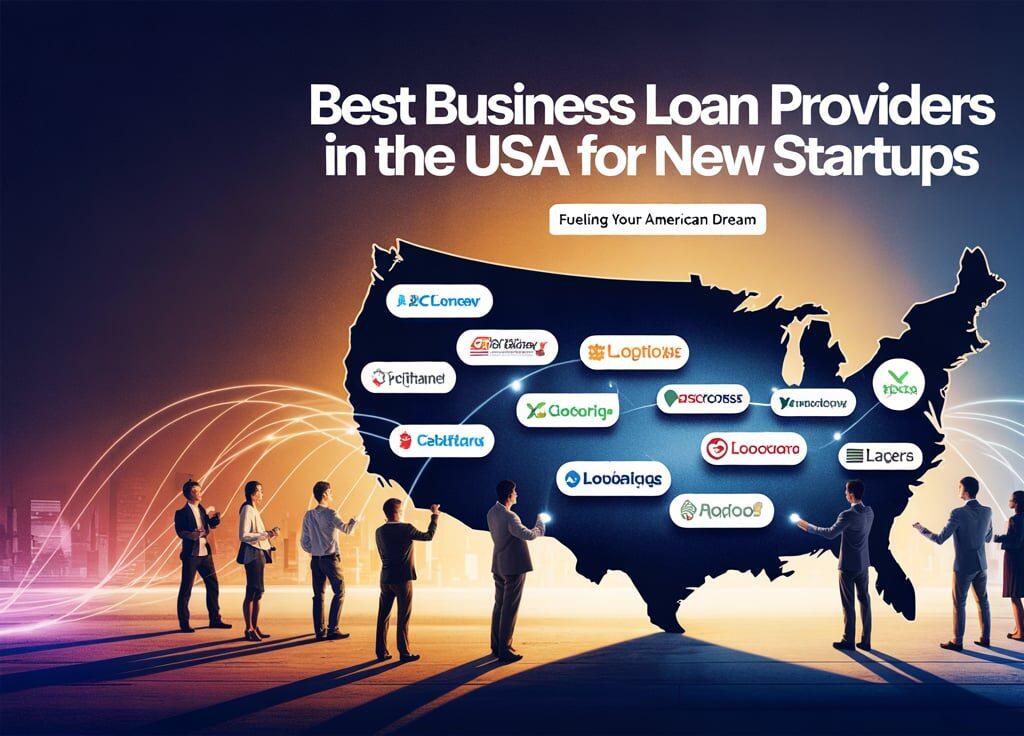Launching a new business in the United States is both an exciting and financially demanding journey. For startups, accessing the right funding at the right time can make the difference between growth and stagnation. With 2025 ushering in more competition, evolving economic trends, and a surge in digital-first lending platforms, identifying the best business loan providers in the USA for new startups has become critical for entrepreneurs seeking to scale responsibly. This guide will navigate through the complex landscape of startup financing, focusing on high-value loan options, low-fee fintech solutions, and top lenders for new businesses, while using trusted data to help you make informed decisions.
Understanding the Modern Startup Loan Landscape
In 2025, the startup loan ecosystem has significantly evolved, influenced by fintech innovation, alternative lending models, and government support programs. Traditional banks are no longer the sole gatekeepers of capital. Now, fintech startup loan providers, non-bank business lenders USA, and AI-driven startup loan platforms offer a wide range of lending products designed specifically for new entrepreneurs, even those without established credit histories or significant revenue.
Startups can now explore business loans with instant approval, unsecured startup loans USA, and low doc startup business loans, which eliminate the cumbersome paperwork associated with legacy banking systems. This accessibility is a boon for business loans for new LLC 2025 applicants and startup business loans backed by revenue, offering fast, scalable funding that supports early-stage operations.
Choosing the Best Business Loan for Startups in 2025
Every startup has unique financial needs depending on the business model, growth trajectory, and credit profile. Therefore, startup business loan comparison USA is essential before committing to any provider. Whether you’re looking for business loans under $50K for startups or a high limit business credit line for startups, the market offers a variety of flexible options.
The best SBA loan options for startups, for instance, continue to offer favorable terms for businesses that meet certain eligibility criteria, such as employing under 500 people and operating within specific sectors. On the other hand, private lenders for startup businesses and best small business funding companies provide agility, often skipping traditional requirements like tax documentation and collateral.
Many new entrepreneurs are seeking startup business loan with no revenue or startup business loan with EIN only, and in 2025, this demand is being met through innovative lending technologies. These lenders leverage predictive models and alternative data to approve applications swiftly, with some offering startup loan with delayed repayment options to ease cash flow during the first few quarters of business.
Comparing the Top Online Business Lenders in 2025
The table below compares some of the top online business lenders 2025, based on loan terms, APR, collateral requirements, and ease of application. This comparison helps startups find the best fintech lenders for startups, ensuring they can access capital on terms that support growth without undue risk.
| Lender | Loan Amount | APR Range | Approval Time | Collateral Required | Best For |
|---|---|---|---|---|---|
| Lendio | $1,000 – $500,000 | 6% – 30% | 24–72 hours | No | Startup loan vs business credit card seekers |
| BlueVine | $5,000 – $250,000 | 4.8% – 30% | Same-day | No | Startup working capital loans |
| Fundbox | $1,000 – $150,000 | 4.6% – 28% | 24 hours | No | Low interest startup business loans |
| OnDeck | $5,000 – $250,000 | 9.99% – 35.9% | Within 1 business day | Sometimes | Startup equipment financing offers |
| Kabbage by AmEx | $2,000 – $250,000 | 9% – 36% | 1–3 days | No | Easy approval business loans 2025 |
Key Factors in Startup Loan Decision-Making
When evaluating the best startup loan terms 2025, several factors must be carefully analyzed. First, consider the APR and fees. Hidden charges can turn a seemingly affordable loan into a financial burden. Use a new business loan calculator 2025 to estimate total repayments, including interest and origination fees.
Second, assess the repayment flexibility. Some providers offer startup loans with no down payment or flexible withdrawal models that help startups manage expenses dynamically. Others provide grace periods, allowing repayment to begin only after the business becomes profitable.
Third, check for no credit check startup business loans if your credit profile isn’t strong. These loans focus more on cash flow projections and business viability rather than your personal credit score.
Finally, compare LLC startup loan comparison options if your business is structured as a limited liability company. Loan structures can differ significantly for LLCs versus sole proprietorships, especially when it comes to guarantees and risk exposure.
Exploring Tax-Free and Low-Fee Business Funding Options
One of the most appealing developments in 2025 is the rise of tax-free business funding options. Certain grants and government-backed loans are exempt from federal taxes, offering cost-efficient capital that doesn’t impact your end-of-year financials. Moreover, startup financing with low fees is increasingly common, as competition among lenders drives down administrative costs.
For those looking to avoid personal liability, a business loan with no personal guarantee can safeguard your personal assets. These are ideal for founders seeking to maintain a clear separation between personal and business finances.
Additionally, alternative business loan providers USA and B2B loan comparison for startups give entrepreneurs more control, helping them sidestep traditional banking models while still accessing competitively priced funding. These options can be essential when evaluating commercial loan offers for new business projects or funding product launches.
Navigating Government and Microloan Opportunities
In parallel with the private market, government startup loans 2025 USA remain a critical part of the funding ecosystem. These loans often feature lower interest rates, longer repayment terms, and are ideal for businesses in underserved communities or specific industries like manufacturing and green energy.
Also worth exploring are startup microloans for new businesses, which provide smaller funding amounts (usually under $50K) but with fast processing and low eligibility barriers. Ideal for first-time entrepreneurs, these loans are often issued through community development financial institutions (CDFIs) and nonprofit lenders.
Leveraging Business Credit for Growth
Beyond traditional loans, startups should also consider best business credit offers for new companies. Business credit cards and lines of credit allow for ongoing access to funds, especially useful for managing operational expenses and cash flow fluctuations. Some high limit business credit lines for startups can scale with your business as it grows, offering a hybrid financing model with flexibility and control.
When weighing options between a startup loan vs business credit card, think about your funding timeline. Loans typically offer lump sums with fixed repayment terms, while credit cards provide revolving credit that can be reused once paid down.
How to Apply for a Startup Business Loan Online
Today, applying for a startup loan can be done completely online in a matter of minutes. Knowing how to apply for a startup business loan online involves preparing key documents such as your business plan, EIN, projected financials, and basic personal identification. Many platforms also require connecting your business bank account or accounting software for revenue verification.
With digital underwriting systems, most decisions are delivered quickly, enabling fast startup business loan approvals. In many cases, applicants can receive funding in their business account within 24 to 48 hours.
Final Thoughts
Accessing the best business loans for startups 2025 requires more than just clicking “Apply Now.” It demands a deep understanding of lending criteria, fee structures, and your own business model. Whether you’re comparing startup business loans without tax returns, looking for low interest startup business loans, or exploring fintech startup business loan comparison platforms, the key to success lies in doing your due diligence.
As more top rated startup loan companies USA emerge, founders now have more power and choice than ever before. By tapping into the right financial tools and new business loan offers 2025, your startup can scale with confidence and long-term financial stability.
Frequently Asked Questions (FAQs)
1. What are the best small business loan providers with no collateral in the USA?
Several non-bank and fintech lenders such as Fundbox, Kabbage, and BlueVine offer unsecured loans that do not require collateral. These are ideal for startups without significant assets but with strong business plans or revenue projections.
2. Can I get a startup business loan with no revenue or tax returns?
Yes, in 2025, many lenders offer startup business loan with no revenue and startup business loans without tax returns. These lenders typically use alternative data or future revenue projections for loan approval, especially if you’re applying through fintech platforms.
3. What’s the difference between a startup loan and a business credit card?
A startup loan vs business credit card comparison boils down to structure. Startup loans provide a lump sum with fixed terms, while business credit cards offer revolving credit, often with reward programs. Loans are better for large purchases; credit cards offer flexible short-term funding.
4. How do I compare business loan interest rates in the USA?
Use a startup business loan comparison USA tool or a new business loan calculator 2025 to analyze interest rates (APR), total repayments, and hidden fees. Always consider the loan term and repayment flexibility alongside the nominal rate.
5. Are there government-backed startup loans available in 2025?
Yes, government startup loans 2025 USA are available through SBA programs and state-level initiatives. These often feature lower interest rates, longer repayment periods, and minimal fees, making them attractive for qualifying startups.


